 In the last few weeks, there has been a resurgence of news articles about movie flops (sometimes called ‘box office bombs’). These have been sparked by recent under-performing releases such as London Fields, Robin Hood and The Nutcracker and the Four Realms and fueled by the public’s Schadenfreude at watching big movies fail.
In the last few weeks, there has been a resurgence of news articles about movie flops (sometimes called ‘box office bombs’). These have been sparked by recent under-performing releases such as London Fields, Robin Hood and The Nutcracker and the Four Realms and fueled by the public’s Schadenfreude at watching big movies fail.
A few readers have asked me about the wider trends behind flops, so I thought I’d turn to the data to have a look.
The very first thing to say on the topic is that whether a movie has flopped is often a subjective judgement. A small number of releases will have failed by everyone’s measurement but many box office disappointments will only be regarded as flops by some people.
For the purposes of this article, I’m going to define a flop as: A feature film which received a wide domestic theatrical release, but which domestically grossed under half of its production budget.
In the film industry, “domestically” means in America and Canada and a “wide” release is where the film was available in at least 600 cinemas in a single week. So a film which cost $50 million to make but which grossed under $25 million in American and Canadian cinemas could qualify. Later, we’ll add in the worldwide gross and see how that changes things.
3,033 fiction feature films have had a wide domestic release between 1st January 1999 and 1st December 2018 and so these will form our core dataset. (The Notes section at the end of the article gives more details about my criteria and methodology).
How many “domestic flops” have there been?
Using the criteria I laid out above, 544 movies ‘bombed’ – 18.6% of all releases.
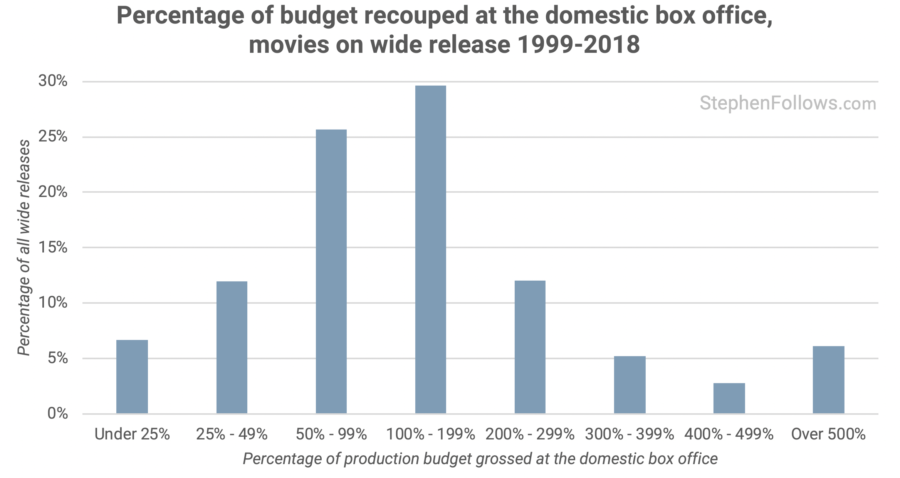
Over 40% of all historical films which opened in a wide release over the ten years I studied flopped (by my definition) – unlike animations, where only 12% failed to hit the mark.
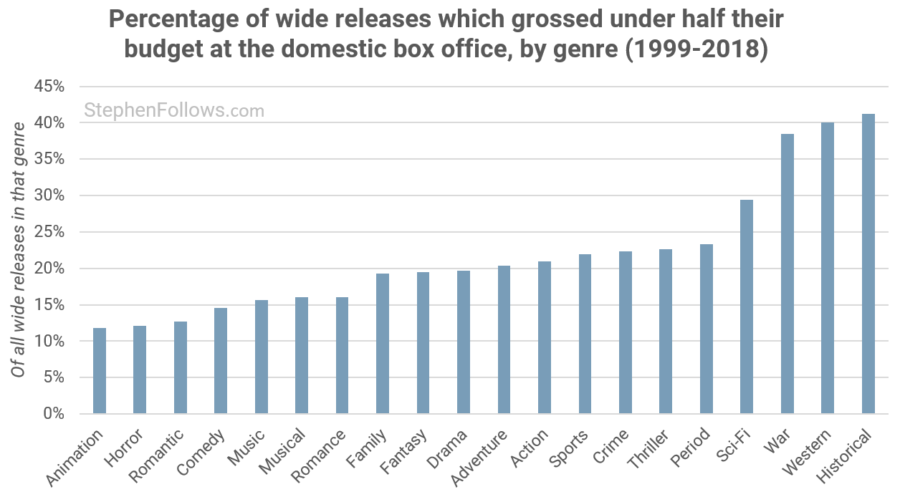
How is the ‘flop rate’ changing over time?
Interestingly, the number of disappointments was declining throughout the 2000s, only to start rising again from 2012.
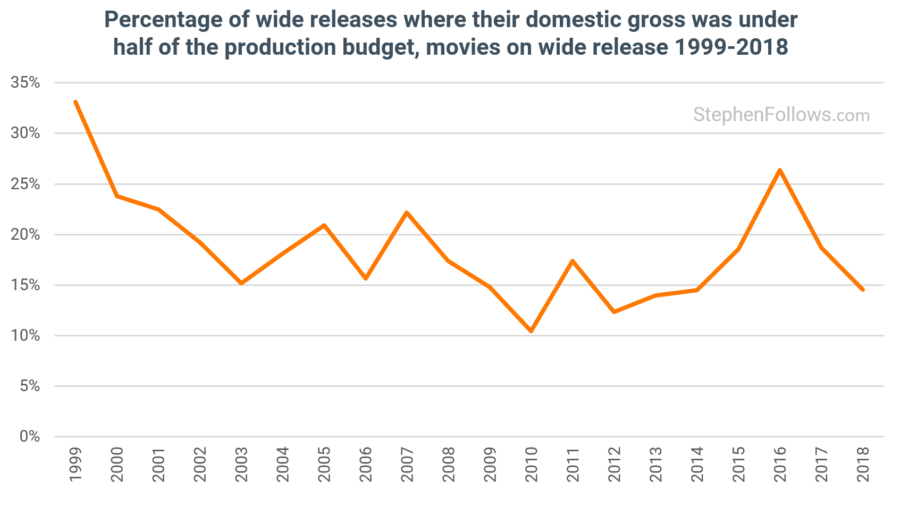
The biggest flops
It’s not possible to generate a single definitive list of “the biggest flops” in any meaningful sense as there are so many factors to take into account. Is it the amount of money lost, or the percentage of the budget which matters? How much did the Studio spend on marketing? Did the film do well on other media after it left cinemas?
However, in order to give you a few easy examples to bear in mind when thinking of flops, below are the twenty films which have the largest numerical difference between their publicly-stated budget and their domestic box office gross (wide releases 1999-2018):
- John Carter – $250m budget, $73.1m Dom BO = $176.9m difference
- Battleship – $209m budget, $65.4m Dom BO = $143.6m difference
- Valerian and the City of a Thousand Planets – $180m budget, $41.2m Dom BO = $138.8m difference
- 47 Ronin – $175m budget, $38.4m Dom BO = $136.6m difference
- King Arthur: Legend of the Sword – $175m budget, $39.2m Dom BO = $135.8m difference
- Jack the Giant Slayer – $195m budget, $65.2m Dom BO = $129.8m difference
- Jupiter Ascending – $176m budget, $47.4m Dom BO = $128.6m difference
- Mars Needs Moms – $150m budget, $21.4m Dom BO = $128.6m difference
- The 13th Warrior – $160m budget, $32.7m Dom BO = $127.3m difference
- The Lone Ranger – $215m budget, $89.3m Dom BO = $125.7m difference
- Alexander – $155m budget, $34.3m Dom BO = $120.7m difference
- Pacific Rim Uprising – $176m budget, $59.6m Dom BO = $116.4m difference
- Pan – $150m budget, $35.1m Dom BO = $114.9m difference
- Warcraft – $160m budget, $47.4m Dom BO = $112.6m difference
- The Golden Compass – $180m budget, $70.1m Dom BO = $109.9m difference
- Prince of Persia: The Sands of Time – $200m budget, $90.8m Dom BO = $109.2m difference
- Gods of Egypt – $140m budget, $31.2m Dom BO = $108.8m difference
- Hugo – $180m budget, $73.9m Dom BO = $106.1m difference
- Final Fantasy: The Spirits Within – $137m budget, $32.1m Dom BO = $104.9m difference
- Stealth – $135m budget, $32.1m Dom BO = $102.9m difference
The scatter plot below shows all 544 movies which managed to fall below my flop standard. As you can see, some were quite narrow flops while others were clearly massive failures.
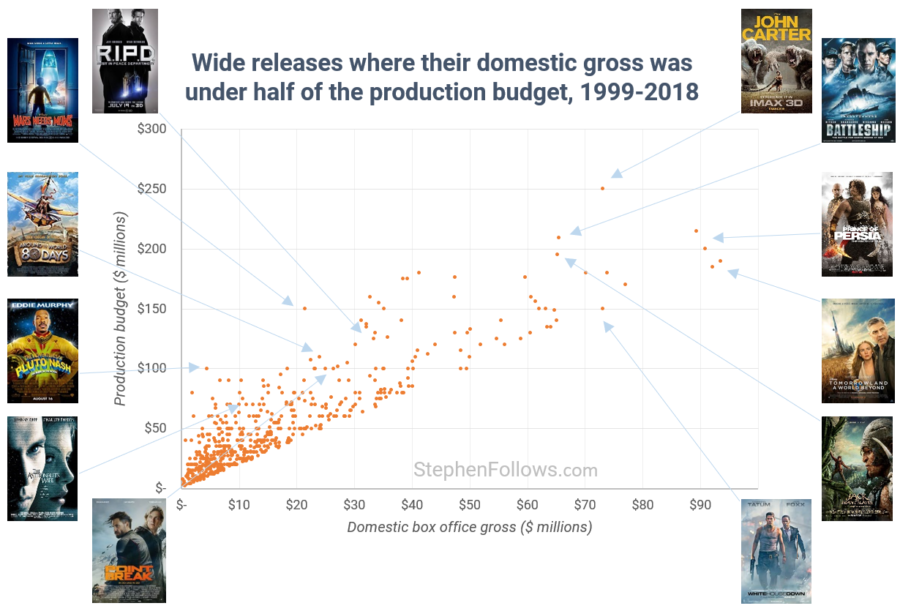
Did these movies lose money?

You may assume that if a movie under-performs in cinemas then it will surely have lost money for its investors. The truth is a little less clear-cut.
A movie’s domestic box office performance is often a good clue as to how audiences are responding to it. A surprisingly low gross would indicate that the movie is unlikely to reach profitability. However, most modern movies are released globally and so far we have only been tracking the North American box office.
The worldwide box office has far less reliable data than the domestic market. We have to take into account currency changes, missing data, false data (i.e. Chinese box office data can sometimes be quite suspect) as well as widely varying business terms between studios and cinemas in each country.
What we can do is fall back on an industry rule of thumb. This states that a movie has a high likelihood of having turned a profit if its worldwide box office gross is twice that of its production budget. I have covered profitability in detail before (links below) and this rule of thumb is a little crude. However, it will allow us to identify which ‘domestic flops’ were most likely to have been saved by a strong international performance.
Just fourteen of our wide domestic flops performed so well internationally to pull them up to this bar. These were:
- The Imaginarium of Doctor Parnassus – $30m budget, $7.7m Domestic BO, $61.8m total worldwide BO
- The Golden Compass – $180m budget, $70.1m Domestic BO, $372.2m total worldwide BO
- Gulliver’s Travels – $112m budget, $42.8m Domestic BO, $237.4m total worldwide BO
- The Expendables 3 – $100m budget, $39.3m Domestic BO, $214.7m total worldwide BO
- Geostorm – $100m budget, $33.7m Domestic BO, $221.6m total worldwide BO
- Dragon Wars – $32m budget, $11m Domestic BO, $75.1m total worldwide BO
- Garfield: A Tail of Two Kitties – $60m budget, $28.4m Domestic BO, $141.7m total worldwide BO
- Irrational Man – $11m budget, $4m Domestic BO, $27.4m total worldwide BO
- The Pyramid – $7m budget, $2.8m Domestic BO, $16.9m total worldwide BO
- Warcraft – $160m budget, $47.4m Domestic BO, $433.7m total worldwide BO
- Inferno – $75m budget, $34.3m Domestic BO, $220m total worldwide BO
- Johnny English Reborn – $45m budget, $8.3m Domestic BO, $160.1m total worldwide BO
- The Impossible – $40m budget, $19m Domestic BO, $180.3m total worldwide BO
- Ponyo – $34m budget, $15.1m Domestic BO, $201.8m total worldwide BO
A further 26 of our flops grossed over 150% of their budget worldwide, missing the general rule but not by much.
 There’s also the rare case where movies have insured their losses by agreeing “pre-sales” with distributors before the movie is finished. This was the case with Valerian, which was third on my previous list of biggest flops and yet director Luc Beason was quoted as saying “With Valerian, we’ve covered 96% of the budget with pre-sales“.
There’s also the rare case where movies have insured their losses by agreeing “pre-sales” with distributors before the movie is finished. This was the case with Valerian, which was third on my previous list of biggest flops and yet director Luc Beason was quoted as saying “With Valerian, we’ve covered 96% of the budget with pre-sales“.
Finally, we must remember that theatrical box office performance is not the sole measure of a movie’s success. Some movies can dramatically underperform in cinemas only to do very well in other media. Both the original Blade Runner and The Shawshank Redemption performed very badly in cinemas but are now highly successful, both artistically and financially. The technique we used above would fail us in these cases.
So maybe the Home Entertainment market will be kind to London Fields. Or maybe a fierce VOD bidding war for the rights to show Robin Hood will lead Netflix to pay $80 million and tip the movie over into profitability.
Maybe.
I mean, that absolutely will not happen but, in theory, it could.
Further reading
 Here a few of my previous articles which delve deeper into the topics raised today:
Here a few of my previous articles which delve deeper into the topics raised today:
- Do Hollywood movies make a profit?
- How movies make money: $100m+ Hollywood blockbusters
- How is a cinema’s box office income distributed?
- What types of low-budget films make the most money?
- How profitable are horror movies?
- How important is international box office to Hollywood?
If you want to read more on the topic of mega-flops I highly recommend grabbing a copy of Fiasco: A History of Hollywood’s Iconic Flops by James Robert Parish. It covers the story behind a number of doomed productions including Cleopatra, The Cotton Club, Waterworld and Last Action Hero. A great read about some incredible, epic stories – both in front of and behind the camera.
Notes
The data for today’s research came from Box Office Mojo, The Numbers/Opus, IMDb and Wikipedia. I found budget figures for 96% of the movies in the dataset, although it’s impossible to know how accurate these figures are. These budget figures relate to the production of the movie, not to its marketing or distribution.
When conducting research on topics like this, it’s impossible to avoid subjective decisions. Here are the decisions I made when defining my dataset:
- The 2018 data is only up to 1st December 2018.
- This study focuses on films with a wide US release, here defined as playing on at least 600 screens domestically at the widest point of release.
- I excluded re-releases, event cinema screenings, concert/stand-up performances, documentaries and IMAX-only movies.
As I mentioned at the top, my definition of a bomb is just my calculation for this article. There is no objective standard and other people may draw the line in other ways.
Epilogue
This research is focusing on flops, i.e. movies which massively under-performed financially. There is another class of movies which are often conflated with bombs but which are different – turkeys. A turkey is a movie which is judged to be very poor by critics and audiences. This is a topic for a future article…

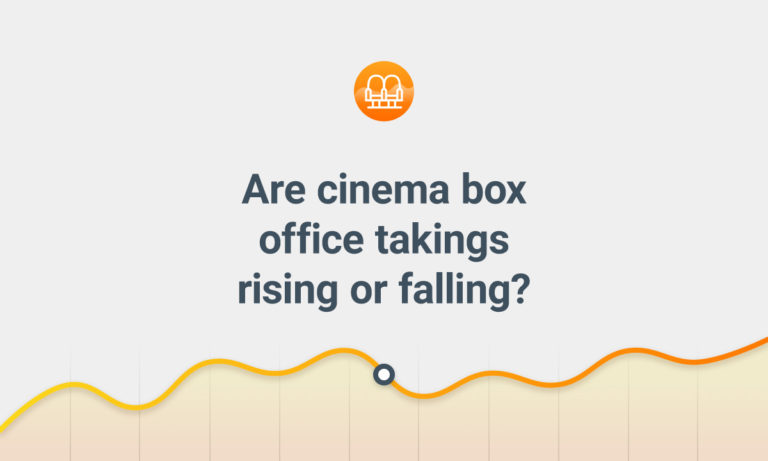
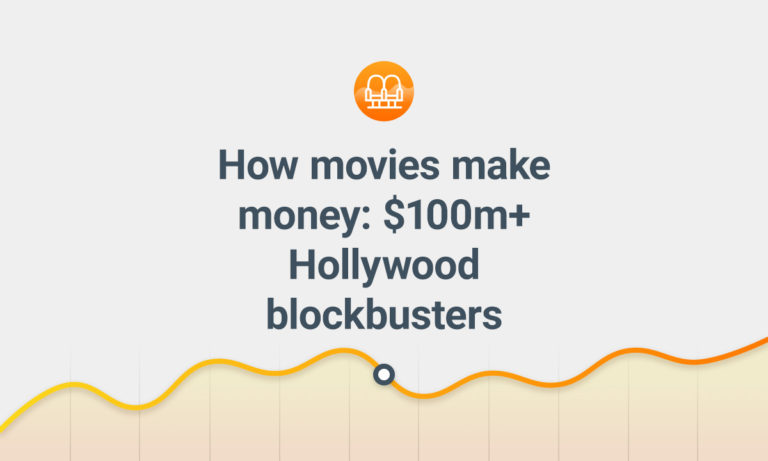


Comments
Thanks again for an interesting article! It highlights for me a few key points –
1. Most of these bombs are movies I have not even heard of, so we may conclude that marketing was not all it could be!
2. Most of those that I have heard of and seen were not very good. Movies bomb for a reason and it would appear that the most usual reason is quality. Boring, formulaic , unappealing subject matter, poor cinematography, slow-moving stories, whatever reason, these movies just failed to grasp the public’s attention.
3. William Goldman nailed it when he wrote “Nobody knows anything! Not one person in the entire motion picture field knows for a certainty what’s going to work. Every time out it’s a guess—and, if you’re lucky, an educated one.”
4. Some really great movies have initially bombed, only to rise again either on the international circuit or via ‘The Long Tail’. If they are well made, such as Silence of the Lambs, Shawshank Redemption and Bladerunner, they survive the long haul. If on the other hand a great movie is otherwise flawed (e.g. Oldboy, Mandy, both great movies but with obvious and avoidable faults) they tend to remain insider tips for a few devotees.
5. The movie industry seriously needs to reinvent itself if it is to survive. In particular, the entire distribution model has to be rebuilt urgently! Bums on seats may have been OK for a while, but the movie theatre has moved into the home and that has to be the focus of success and the source of main revenues.
Lovely article. Bring on the turkeys.
Also, what do you mean by “suspect” in the reporting of Chinese box office figures? Are studios inflating them to make their films seem less of a flop (or suppressing them to reduce revenue sharing)?
Thanks, Jack. No, it’s not the Studio side where the figures can be dodgy. It’s often not in their control to do that and would face legal problems in the US if they did so systemically.
It’s that the Chinese tracking industry is still new and open to manipulation. There are a mix of agendas and errors along the chain of cinemas, government bodies, analysts and others. A good case in point is Looper which was heralded as being a Chinses smash for weeks, until some spotted they had mixed up dollars and yuan. Oops!
An insightful but potentially dangerous follow-on to this article would examine the relative percentage of non-franchise blockbusters vs. flops that were screenwritten by their directors, who may have also (co-)produced the work.
A good example is ‘The Mummy’ (2017). Considered a complete flop, and ultimately responsible for universal cancelling their story arc – globally took 3.1 of the production budget.
Hey Stephen,
Actually, Valerian was a real financial bomb which, added to Anna, could cause the end of Europacorp. Luc Besson’s company is under safeguard procedure since last May and till October, with a debt of about $ 230 M, and seeking buyers.
Its major lender is JP Morgan, its junior one being Vine Alternative Investments which could take control of the group. Right now, its biggest stockholder with Besson is Fundamental Films (China).
Absolutely, it was third on that list. The quote from Luc Besson comes without any data or verification.
That said, it’s totally possible for a film to have the majority of its budget insured via pre sales but still put the production company into financial difficulties. It could be that the company had loans or investments which were based on the expectation of unrealised income. Or they had extra costs in the sales, distribution or marketing of the movie. Or even just plain old overtrading whereby they overextend themselves based on an inflated image of themselves.
I don’t know what happened specifically in this case.
The hilarious part of all this is… I loved most of these movies that bombed. Most, like say, Gods of Egypt, were cool and inventive popcorn flix that were great in the theatre. Granted (when I could), I go to the theatre far more often than the average person, and while none of these movies were The Shawshank Redemption or The Godfather, I enjoyed them for what they were, good times at the theatre.
Funny enough, Waterworld which was considered the biggest BO flop and financial management disaster in Hollywood’s history was confirmed as having reached a profitable point around 14 years after its release through micromanagement of its licenses. By the time its Blu-ray edition went live, it was by then making a profit.